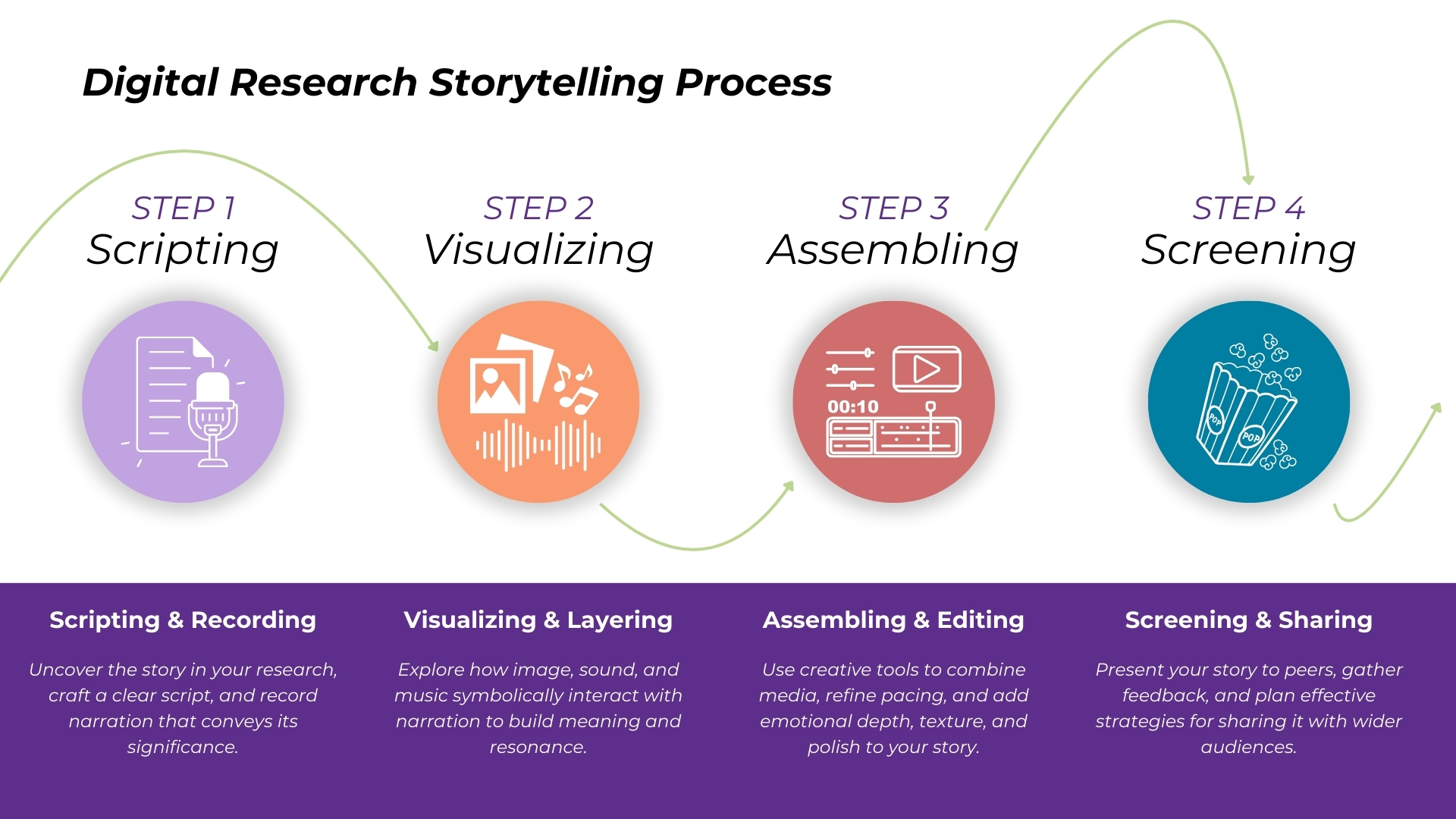Digital Research Storytelling Workshop
What is Digital Storytelling?
Traditionally, digital stories are 2-to-5-minute creative micro documentaries highlighting how inequities and resistances are embedded in people’s lives. The affective dimension of digital stories lends to their impactful use as knowledge translation tools across disciplines and sectors.
Our Approach: Digital Research Storytelling
The Digital Research Storytelling Workshop is a collaboration between the CDHI and UTSC’s Office of the Vice Principal Research and Innovation and UTSC ENGAGE. Together, we’re building on the narrative, technical, creative, and political tools of traditional digital storytelling methods to offer a tailored experience for researchers interested in sharing their findings through engaging and creative short videos. Digital Research Stories can be made at any stage of the research project — the project does not have to be complete to be ready for story-making.
No prior experience is required — we provide all the tools and hands-on support needed.
Our Goal
Our goal with the Digital Research Storytelling Workshop Program is to increase the impact and relevance of researchers’ critical scholarship beyond scholarly domains and to move the needle on social justice issues. Digital Research Stories have the power to challenge epistemic ignorance and compel new understanding of power and in/equity on an affective level that sticks. Ideally, digital research stories move viewers to action. By connecting storytelling with social change in a collaborative research creation environment, digital research storytelling is an important practice of publicly engaged scholarship and a powerful method of creative knowledge mobilization.
What to Expect
In every workshop, you’ll benefit from:
- Hands-on Learning: Develop your narrative, scriptwriting, and technical skills in a supportive, open studio environment.
- Expert Guidance: Trained facilitators guide you through the entire digital research storytelling process, from conception to completion.
- Collaborative Environment: Engage in peer-to-peer learning with a select group of tri-campus U of T participants.
- Final Product: By the end of the workshop, you’ll have a completed digital story about your research.
Additional Program Models
Beyond our core Digital Research Storytelling Workshops, we also offer customized workshop models to fit various needs. Explore the options below and reach out to us to discuss how we can work together.

For Research Participants & Community Partners
We design tailored workshops in collaboration with research leads to meet the specific needs of your study and participants.

For Classroom Integration
We collaborate with professors to adapt our digital research storytelling methods for classroom settings, ensuring alignment with course objectives.

For Consultation Services
Whether you’re planning to run your own workshop or seek support for a research project, we offer consultations to help you achieve your goals.
Book a Consultation Meeting
To explore any of these options, we offer a 20-minute consultation meeting to discuss your needs. After this conversation, we will provide a detailed quote for our services.
What Participants Say
Meet the Facilitators
Julia Gruson-Wood
Read Bio
Julia is Research Partnership and Business Development Officer at the Office of the Vice-Principal Research & Innovation (UTSC) with a particular interest in research creation, publicly engaged scholarship, & knowledge mobilization. She is also an Adjunct Faculty Member with 2 programs at the University of Guelph:
- A community & arts-engaged PhD Program called Social Practice & Transformational Change;
- A multimedia storytelling hub called Re·Vision: The Centre for Art & Social Justice.
Julia received her digital storytelling training from Re·Vision in 2016 & is a longtime Re·Vision-affiliated researcher, methodologist, facilitator, & participant. She has led & collaborated on multiple grant-funded digital storytelling projects with 2SLGBTQI+ parents, Autistic & neurodiversity self-advocates & with Indigenous communities across Turtle Island & Aotearoa. She has published several articles on critical digital storytelling in The Journal of Homosexuality, Sage Research Methods, International Studies of Inclusive Education, & International Journal of Inclusive Qualitative methods.
Alisha Stranges
Read Bio
Alisha is a public humanities scholar and multi-modal artist whose work bridges oral history, performance, and digital research creation.
Currently, she is Research Associate in the Department of Historical Studies at the University of Toronto Mississauga where she serves as Research Manager and Project Oral Historian for the LGBTQ Oral History Digital Collaboratory and as Digital Research Creation Specialist for DH@UofT (formerly CDHI).
She holds an M.A. in Women & Gender Studies from the University of Toronto, with a collaborative specialization in Sexual Diversity Studies. Before entering academia, she earned a Diploma in Theatre Performance from Humber College and spent a decade devising original plays within Toronto’s queer, independent theatre community.
Alessandra Hechanova
Read Bio
Alessandra is a Toronto-based designer specializing in film and documentary websites, portfolio sites, pitch decks, PDF report design, and social media graphics.
She has collaborated with agencies, filmmakers, e-commerce businesses, government organizations, investment firms, start-ups, non-profits, and media outlets. Her projects include campaigns for award-winning documentaries, government announcements, an international cleantech competition, and more than 30 provincial grant programs supporting small businesses and industry-academic research.
Her work has been featured at film festivals and in outlets such as VICE, the Financial Post, Yahoo Finance, The Walrus, Benzinga, Greatist, Elite Daily, Trend Hunter, and Canada’s Science and Technology Museum.
Alessandra holds a degree from McGill University and a certificate in Multimedia Storytelling and Content Marketing from the University of Toronto.










